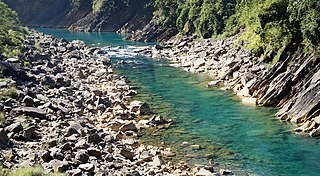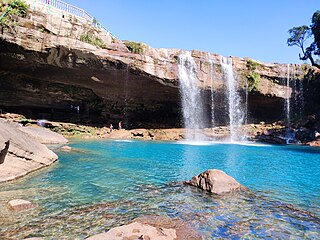Related Research Articles

Meghalaya is a state in northeastern India. Meghalaya was formed by carving out two districts from the state of Assam: the United Khasi Hills and Jaintia Hills, and the Garo Hills on 21 January 1972. Meghalaya was previously part of Assam, but on 21 January 1972, the districts of Khasi, Garo and Jaintia Hills became the new state of Meghalaya. The population of Meghalaya as of 2016 is estimated to be 3,211,474. Meghalaya covers an area of approximately 22,430 square kilometres, with a length-to-breadth ratio of about 3:1.

The Khasi people are an ethnic group of Meghalaya in north-eastern India with a significant population in the bordering state of Assam, and in certain parts of Bangladesh. The Khasi people form the majority of the population of the eastern part of Meghalaya, and is the state's largest community, with around 48% of the population of Meghalaya. They are among the few Austroasiatic-speaking peoples in South Asia. A cultural tradition of the Khasi people is that they follow the matrilineal system. Under the Constitution of India, the Khasis have been granted the status of Scheduled Tribe.

The Jaintia Kingdom was a matrilineal kingdom in present-day Bangladesh's Sylhet Division and India's Meghalaya state. It was partitioned into three in 630 AD by Raja Guhak for his three sons, into the Jaintia Kingdom, Gour Kingdom and Laur Kingdom. It was annexed by the British East India Company in 1835. All the Khasi (Pnar) Rajahs of the Jaintiapur Kingdom are from the Syiem Sutnga clan, a Pnar clan of the Khasi tribe which claims descent from Ka Li Dohkha, a divine nymph.
The Pnar, also known as Jaiñtia, are a sub-tribal group of the Khasi people in Meghalaya, India. The Pnar people are matrilineal. They speak the Pnar Language, which belongs to the Austro-Asiatic language family and is very similar to the Khasi language. The Pnar people are natives of West Jaintia Hills and East Jaintia Hills District of Meghalaya, India. They call themselves as "Ki Khun Hynñiew Trep". Their main festivals are Behdeinkhlam, Chad Sukra, Chad Pastieh and Laho Dance.

Khasi Hills Autonomous District Council (KHADC) is an autonomous district council in the state of Meghalaya in India. It covers West Khasi Hills district, Eastern West Khasi Hills district, East Khasi Hills district and Ri Bhoi district. It is one of the three autonomous district councils within Meghalaya, and one of twenty-five autonomous regions of India. Between its foundation on 27 June 1952 and 14 June 1973 it was known as the United Khasi-Jaintia Hills District Council. The total area of the Khasi Hills Autonomous District Council is 11,718 sq. km having a population of 1,578,375 as of 2011.

Jaintia Hills Autonomous District Council (JHADC) is an autonomous district council in the state of Meghalaya in India. It is one of the three autonomous district councils within Meghalaya, and one of twenty-five autonomous regions of India. Present Jaintia hills was a part of historical Jaintia Kingdom. It was formed as the Jowai Autonomous District Council on 23 November 1964 from the Jowai Subdivision of the United Khasi-Jaintia Hills District – adopting its current name on 14 June 1973.

The Khasi and Jaintia Hills are a mountainous region that was mainly part of Assam and Meghalaya. This area is now part of the present Indian constitutive state of Meghalaya, which includes the present districts of East Jaintia Hills district, headquarter Khliehriat, West Jaintia Hills district, headquarter Jowai, East Khasi Hills district, headquarter Shillong, and West Khasi Hills district, headquarter Nongstoin.
Biate is a Sino-Tibetan language spoken by the Biate people in several parts of Northeast India: in Meghalaya, Assam, Mizoram, Manipur and Tripura. Biate is pronounced as Bia-te (the e in te pronounced as "a".
Myntdu River is one of the major water bodies in Jaintia Hills District, Meghalaya, locally known as 'ka Tawiar ka Takan' in the Pnar dialect. It is a blessing to the residents of the town of Jowai and adjacent places. Its abundant water is used to irrigate the Myntdu Valley, located on the outskirts of Jowai town.
Conversion from indigenous to Christianity began in the 19th century under the British era. In the 1830s, American Baptist Foreign Missionary Society had become active in Northeast to convert indigenous tribes to Christianity. Later, they were offered to expand and reach into Cherrapunji Meghalaya, but they lacked the resources to do so and declined. Welsh Presbyterian Mission took the offer and they began work at the Cherrapunji mission field. By the early 1900s, other Protestant denominations of Christianity were active in Meghalaya. The outbreak of World Wars forced the preachers to return home to Europe and America. It is during this period that Catholicism took root in Meghalaya and neighbouring region. Currently, Presbyterians and Catholics are two most common Christian denominations found in Meghalaya.

East Jaintia Hills district is a district with its headquarters at Khliehriat in Meghalaya state of India. The district was carved out of Jaintia Hills district on 31 July 2012.

West Jaintia Hills is an administrative District in the state of Meghalaya in India. The united district was created on 22 February 1972 and occupied an area of 3819 km2. It had a population of 272,185. The district is part of the Meghalaya subtropical forests ecoregion. With the bifurcation of the erstwhile Jaintia Hills District into East and West Jaintia Hills Districts, West Jaintia Hills District came into existence on 31 July 2012 with its headquarters at Jowai. Jowai is the host of all the heads of important governmental offices and establishments, educational institutions, hospitals, banking institutions, etc.
Hamlet Bareh Ngapkynta (1931-2012) was an Indian writer, historian and film director from the Northeast Indian state of Meghalaya. He is known as the first person from the Khasi tribe, an indigenous ethic group of the state, to secure a doctoral degree (PhD) and as the maker of the first feature film in Khasi language, Ka Synjuk Ri ki Laiphew Syiem. He was the chairman of the executive committee of the Rajiv Gandhi University, Arunachal Pradesh and a recipient of the 2004 Meghalaya Day Award. The Government of India awarded him the fourth highest civilian honour of the Padma Shri in 2004,
Nartiang is one of the 60 Legislative Assembly constituencies of Meghalaya state in India. It is part of West Jaintia Hills district and is reserved for candidates belonging to the Scheduled Tribes. It falls under Shillong Lok Sabha constituency and its current MLA is Sniawbhalang Dhar of National People's Party.
Jowai is one of the 60 Legislative Assembly constituencies of Meghalaya state in India. It is part of West Jaintia Hills district and is reserved for candidates belonging to the Scheduled Tribes. It falls under Shillong Lok Sabha constituency and its current MLA is Wailadmiki Shylla of National People's Party.
Mowkaiaw is one of the 60 Legislative Assembly constituencies of Meghalaya state in India. It is part of West Jaintia Hills district and is reserved for candidates belonging to the Scheduled Tribes. It falls under Shillong Lok Sabha constituency and its current MLA is Nujorki Sungoh of United Democratic Party.
Sutnga Saipung is one of the 60 Legislative Assembly constituencies of Meghalaya state in India. It is part of East Jaintia Hills district and is reserved for candidates belonging to the Scheduled Tribes. It falls under Shillong Lok Sabha constituency and its current MLA is Shitlang Pale of Indian National Congress.
Khliehriat is one of the 60 Legislative Assembly constituencies of Meghalaya state in India. It is part of East Jaintia Hills district and is reserved for candidates belonging to the Scheduled Tribes. It falls under Shillong Lok Sabha constituency and its current MLA is Kyrmen Shylla of United Democratic Party.
Amlarem is one of the 60 Legislative Assembly constituencies of Meghalaya, a north east state of India. It is part of West Jaintia Hills district and is reserved for candidates belonging to the Scheduled Tribes. It falls under Shillong Lok Sabha constituency and its MLA is Lahkmen Rymbui of United Democratic Party.
Raliang is one of the 60 Legislative Assembly constituencies of Meghalaya state in India. It is part of West Jaintia Hills district and is reserved for candidates belonging to the Scheduled Tribes. It falls under Shillong Lok Sabha constituency and its current MLA is Comingone Ymbon of National People's Party.
References
- ↑ "The Khonglah Clan | Cults of the Khla". cultsofthekhla.com. Retrieved 2 March 2022.
- ↑ Roy, Hira Lal Deb (1981). "A Tribe in Transition: The Jaintias of Meghalaya".